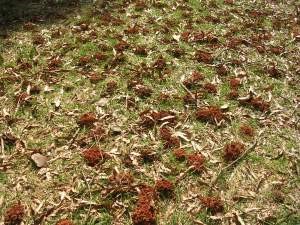Finding Holes in Your Lawn? Could Be Ground Bees
go.ncsu.edu/readext?782887
en Español / em Português
El inglés es el idioma de control de esta página. En la medida en que haya algún conflicto entre la traducción al inglés y la traducción, el inglés prevalece.
Al hacer clic en el enlace de traducción se activa un servicio de traducción gratuito para convertir la página al español. Al igual que con cualquier traducción por Internet, la conversión no es sensible al contexto y puede que no traduzca el texto en su significado original. NC State Extension no garantiza la exactitud del texto traducido. Por favor, tenga en cuenta que algunas aplicaciones y/o servicios pueden no funcionar como se espera cuando se traducen.
Português
Inglês é o idioma de controle desta página. Na medida que haja algum conflito entre o texto original em Inglês e a tradução, o Inglês prevalece.
Ao clicar no link de tradução, um serviço gratuito de tradução será ativado para converter a página para o Português. Como em qualquer tradução pela internet, a conversão não é sensivel ao contexto e pode não ocorrer a tradução para o significado orginal. O serviço de Extensão da Carolina do Norte (NC State Extension) não garante a exatidão do texto traduzido. Por favor, observe que algumas funções ou serviços podem não funcionar como esperado após a tradução.
English
English is the controlling language of this page. To the extent there is any conflict between the English text and the translation, English controls.
Clicking on the translation link activates a free translation service to convert the page to Spanish. As with any Internet translation, the conversion is not context-sensitive and may not translate the text to its original meaning. NC State Extension does not guarantee the accuracy of the translated text. Please note that some applications and/or services may not function as expected when translated.
Collapse ▲In the spring, as the soil warms up, it can be common to see small bees flying around just above the ground and small mounds of soil they have created in the lawn. These bees are called ground nesting bees.
Ground nesting bees are a type of bee that is different from other kinds of bees. These bees are solitary and nest unlike other species of bees that typically live together in a colony. A single female bee builds a nest by burrowing into the ground where she lays eggs and seals the entrance. After a few weeks of doing this, she will die leaving the next generation safe in the ground. In the spring, the bees complete their development and emerge as adults by digging their way out of the ground. Once they emerged from the ground, these solitary bees begin to forage for nectar and pollen.
The site of many of these bees emerging and flying around the ground at the same time often triggers concern. Many people become concerned that these small bees may sting. The good news is that the bees are completely harmless to humans and a lawn. The threat of being stung by ground nesting bees is very small. Majority of ground nesting bees seen flying around are males who do not have stingers and are simply looking for a female to mate with. The females, who are busy with nest construction in the ground, typically do not have well-developed stingers. Ground nesting bees can be handled with little to no risk of being stung. Ground nesting bees are not aggressive because they are solitary bees who work and fly alone instead of together in a colony.
Some people become concerned that the bees will damage their lawn when they see the many small mounds of soil. The bees do not damage the lawn in anyway and actually help aerate the lawn. These bees prefer to nest in dry soils where the grass is thin. The bees don’t make the lawn this way but just take advantage of the conditions. If you are bothered by soil mounds they create in a lawn, you can create a less favorable environment for them. Since they like dry soils, irrigation over the 3 to 4 weeks they are active can encourage them to find other nest sites. In addition, they like thin lawns with plenty of bare spots. Thus, you can take measures to improve the density of your grass to make it less appealing to bees.
The recommendation when you see ground nesting bees in the spring is to simply ignore them and they will soon be gone. Ground nesting bees are native bees. They are beneficial insects that are important for pollination of many plants. Since they are beneficial and harmless it is not recommended to control them with an insecticide but to instead protect them.
Jessica Strickland is an Agriculture Extension Agent, specializing in horticulture for North Carolina Cooperative Extension in Wayne County.
Learn More!
- Sign up for the Wayne County Extension Gardening email list to receive timely gardening tips.
- Follow us on Facebook and Instagram.
- Visit the North Carolina Extension Gardener Plant Toolbox to discover more plant ideas for your garden.





